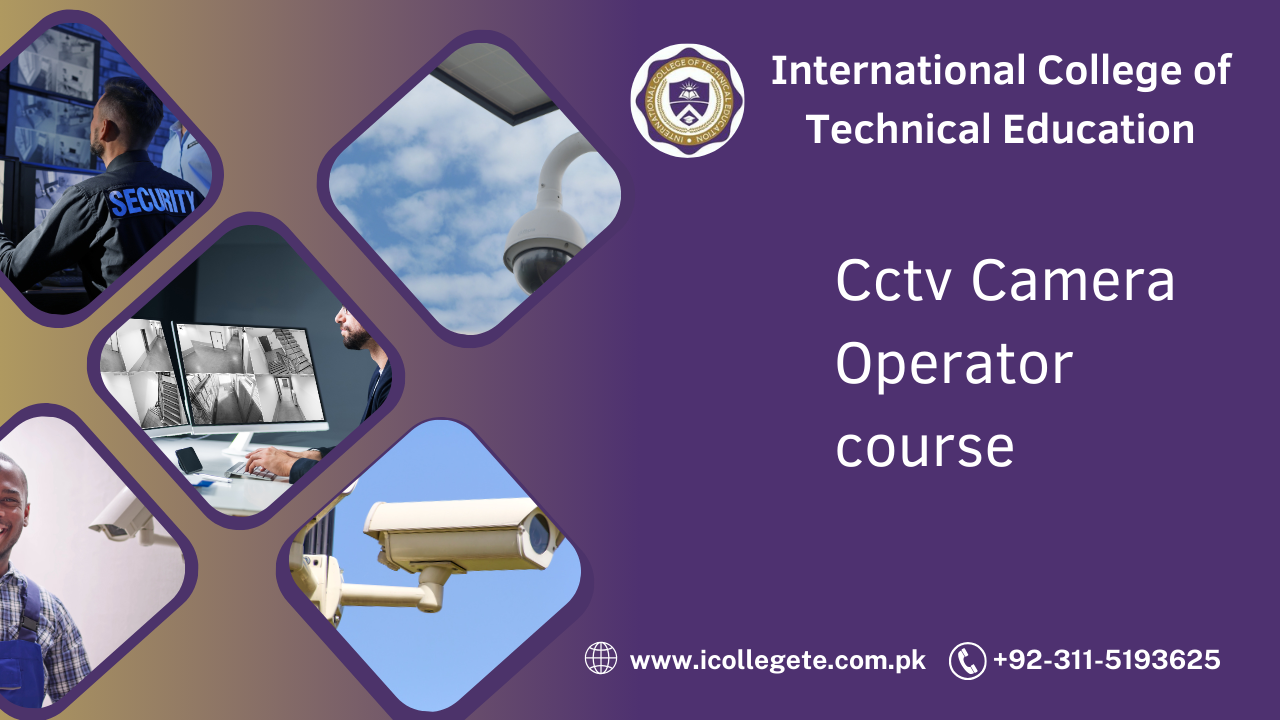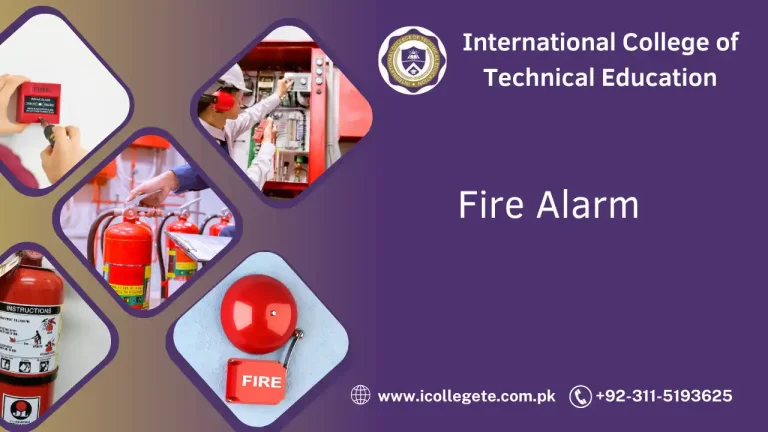In today’s world, security has become a top priority for businesses, homes, and public spaces. As a result, the demand for skilled CCTV camera operators is on the rise. A CCTV Camera Operator course in Rawalpindi equips individuals with the essential skills and knowledge required to operate surveillance systems effectively.
A CCTV Camera Operator is responsible for monitoring and operating surveillance systems to ensure the safety and security of premises. Whether in retail stores, government buildings, or private residences, the role of a CCTV operator is vital in preventing criminal activity and maintaining a secure environment. The CCTV Camera Operator course in Rawalpindi is designed to teach individuals how to effectively use and manage CCTV systems, from camera installation and configuration to monitoring live feeds and troubleshooting issues.
With the growing need for security professionals, this course offers a solid foundation for those looking to pursue a career in surveillance and security systems, providing a mix of theoretical knowledge and practical skills in CCTV operation.
Course Overview
The CCTV Camera Operator course covers the technical aspects of CCTV systems, including the installation, maintenance, and operation of cameras and monitoring equipment. Students will learn how to set up surveillance systems, interpret footage, and handle the different types of cameras and equipment commonly used in modern surveillance setups. The course also covers various aspects of security monitoring, including data storage, encryption, and troubleshooting techniques.
Students will be introduced to the software and hardware tools used in CCTV operations, along with a focus on ethical and legal considerations when monitoring footage. The course is ideal for those seeking a career in security or anyone interested in gaining a deeper understanding of surveillance technology.
Study Units
The CCTV Camera Operator course is typically divided into various study units to ensure comprehensive learning. These may include:
- Introduction to CCTV Systems
- Overview of CCTV systems and their importance in modern security setups.
- Types of CCTV cameras and their uses (e.g., dome, bullet, PTZ cameras).
- CCTV Camera Installation and Configuration
- Basic installation techniques for CCTV cameras.
- Configuration and setup of surveillance systems, including positioning, wiring, and connectivity.
- Operating CCTV Systems
- Learning to monitor live feeds, review footage, and interpret images.
- Understanding the functions of the central monitoring station and managing footage.
- Camera Troubleshooting and Maintenance
- Identifying and solving common problems with CCTV cameras.
- Regular maintenance practices to ensure systems function properly.
- Security and Privacy Considerations
- Understanding the legal and ethical aspects of CCTV surveillance.
- How to protect privacy while ensuring effective monitoring.
- Data Storage and Retrieval
- Understanding digital storage solutions for CCTV footage.
- How to store, archive, and retrieve surveillance footage as per legal requirements.
- Networked CCTV Systems
- Introduction to IP-based CCTV systems and how they differ from traditional analog systems.
- Configuring networked cameras and understanding remote monitoring capabilities.
- Advanced CCTV Features and Software
- Exploring advanced features such as motion detection, facial recognition, and analytics.
- Introduction to CCTV monitoring software for efficient management.
- Ethical and Legal Issues in CCTV Monitoring
- Understanding the laws governing CCTV use, data privacy, and surveillance ethics.
- Best practices to ensure compliance with local laws and regulations.
Learning Outcomes
Upon completing the CCTV Camera Operator course, students will be able to:
- Install and configure CCTV systems, including various types of cameras and recording devices.
- Operate CCTV systems efficiently, monitor live feeds, and interpret footage accurately.
- Perform troubleshooting and routine maintenance on CCTV equipment.
- Understand legal and ethical considerations related to surveillance and ensure compliance with privacy regulations.
- Be proficient in data storage and retrieval systems for CCTV footage, including digital storage methods and archival procedures.
- Utilize advanced CCTV software and networked systems for enhanced monitoring and control.
- Apply best practices in security monitoring, ensuring safety and privacy are maintained while effectively managing surveillance systems.
Course Benefits
Enrolling in the CCTV Camera Operator course in Rawalpindi offers several key benefits:
- Job Security: As the need for security increases, trained CCTV operators are in demand across a range of industries, from retail to corporate settings, public institutions, and more.
- Comprehensive Skillset: The course provides a blend of technical skills and legal knowledge, ensuring you are well-rounded in both the operational and ethical aspects of CCTV monitoring.
- Hands-On Training: Practical, hands-on experience with CCTV systems and software ensures you are ready for real-world security roles upon completion.
- Competitive Advantage: A certified CCTV camera operator has an edge in the job market, especially in the expanding security industry.
- Lucrative Career Options: CCTV operators can work in various sectors, including law enforcement, private security firms, retail, hospitality, and government services.
- Future Specialization: The course lays the groundwork for future specialization in related areas like security systems installation, networked security, or advanced video surveillance analytics.
Who Is This Course For?
The CCTV Camera Operator course in Rawalpindi is suitable for a wide range of individuals, including:
- Beginners in Security Systems: Those with little to no experience in security who want to begin a career in the growing surveillance industry.
- Security Personnel: Existing security professionals who want to formalize their skills and gain a deeper understanding of CCTV systems.
- Tech Enthusiasts: Individuals with a strong interest in technology and security who want to specialize in CCTV and surveillance systems.
- Facility Managers and Supervisors: People responsible for the security of buildings and premises who want to enhance their knowledge of CCTV operations.
- Business Owners: Entrepreneurs in the retail or hospitality sectors who wish to manage or oversee CCTV installations for their properties.
- Law Enforcement and Government Personnel: Those working in law enforcement or government sectors who require additional training in modern surveillance tools.
Future Progression
Upon successful completion of the CCTV Camera Operator course, there are several avenues for career progression:
- CCTV Operator/Technician: Start as a CCTV operator in various security settings, including shopping malls, office buildings, or transport hubs, where you will be responsible for monitoring and managing surveillance feeds.
- Security Systems Technician: Expand your expertise into security systems installation and maintenance, working on a broader range of security technologies beyond just CCTV.
- Surveillance Specialist: Focus on high-level surveillance systems, including IP-based cameras, advanced analytics, and automated security features, often used in large-scale security operations.
- Security Manager: Take on a managerial role overseeing security operations, including CCTV monitoring, alarms, and other security technologies for large companies or institutions.
- Consultant: After gaining extensive experience, you may move into a consulting role, advising businesses on the best security solutions, including CCTV system design and implementation.
- Entrepreneurship: Starting your own CCTV installation and monitoring business could be a lucrative option, providing services to residential, commercial, and industrial clients.
- Specialized Roles: As technology advances, further specialization in areas like facial recognition systems, AI-based surveillance, or cybersecurity for CCTV networks can offer higher-level career opportunities.
The CCTV Camera Operator course in Rawalpindi is an excellent opportunity for anyone looking to start a career in the growing field of security. With a curriculum that combines technical knowledge, legal considerations, and practical experience, this course prepares students to manage and monitor CCTV systems in a wide range of environments. Whether you’re a beginner or someone looking to specialize further, this course offers the foundation for a secure, rewarding, and dynamic career in the ever-evolving world of surveillance technology.







